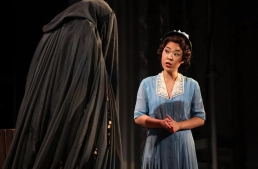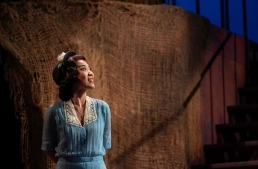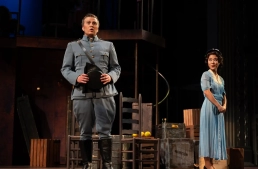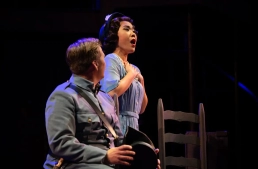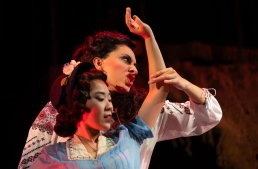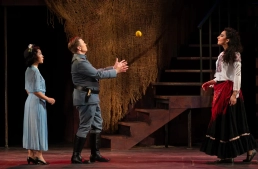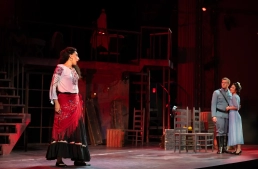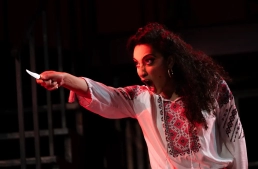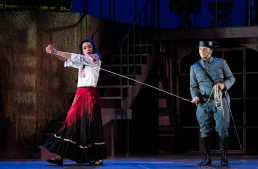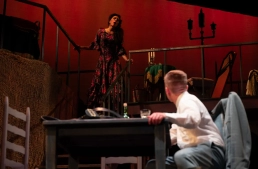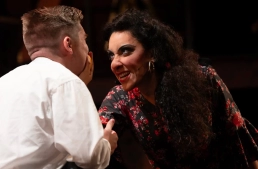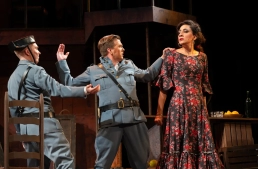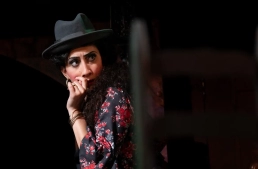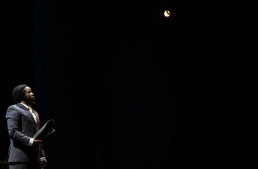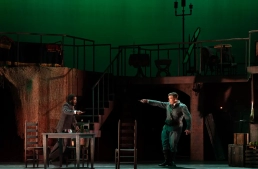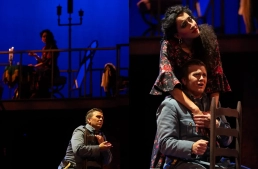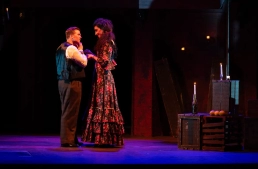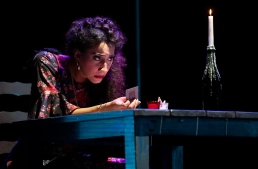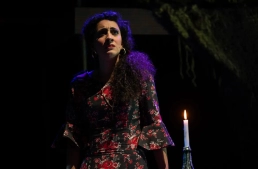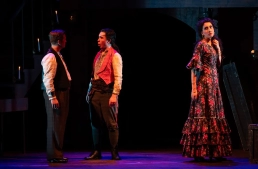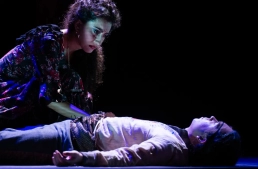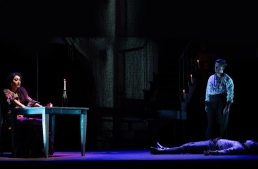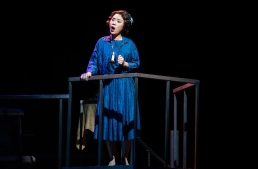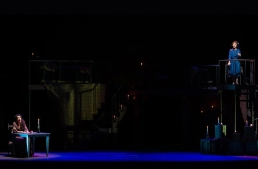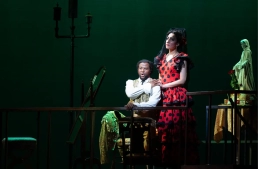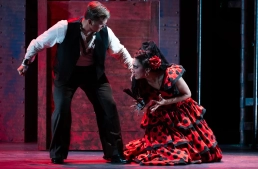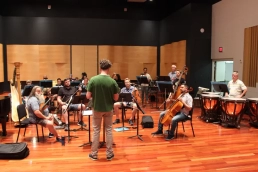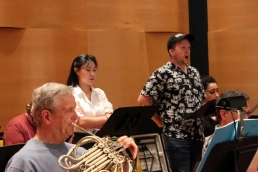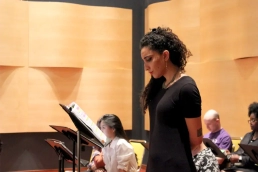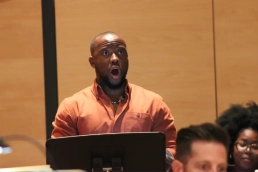Music by Georges Bizet, Adapted by Peter Brook, Written by Jean-Claude Carrière, Composed by Marius Constant
La Tragédie de Carmen
Chautauqua Institution, July 20 - 21, 2023
Creative & Production Teams
Stage Director: Chía Patiño
Conductor: Steven Osgood
Set Designer: Brian Ruggaber
Lighting Designer: Michael Baumgarten
Sound Designer: Graham Riggle
Costume Supervisor: Cristine Patrick
Wig & Makeup Supervisor: Martha Ruskai
Assistant Stage Director: Kia Smith
Props Director: Wendy Ann
Technical Director: John P. Woodey
Assistant Conductor: Carol Rausch
Coach/Pianist: Emily Jarrell Urbanek, Nathaniel LaNasa
Diction Coach/Supertitles: Allison Voth
Cast
Carmen – Monique Galvão
Micaëla – Lili Juyeon Yoo
Don José – Louis Tiemann
Escamillo – Tshilidzi Ndou
Lillas Pastia – Brian Jeffers
Zuniga and Garcia – Evan Lazdowski
Supernumeraries – Nathan Bowles, Alexis Peart, Atticus Rego, Nathan Savant, Trevor Scott
Chautauqua Opera Orchestra
Violin I – Vahn Armstrong
Violin II – Jonathan Richards
Viola – Chris Fischer
Cello – Lars Kirvan
Bass – P.J. Cinque
Flute – Kathy Levy
Oboe/English Horn – Adam Dinitz
Clarinet – Dan Spitzer
Bassoon – Jeff Robinson
Horn – Bill Bernatis
Trumpet – Les Linn
Trombone – Aidan Chamberlain
Timpani – Brian Kushmaul
Percussion – Tom Blanchard, Principal
Pedro Fernandez
Harp – Beth Robinson
Piano – Nathaniel LaNasa
Director’s Notes on The Tragédie de Carmen, or the importance of dissenting voices.
When Peter Brook accepted to adapt Bizet’s Carmen in the 80’s, he went back to the source and tried to refocus the story to its origin. Prosper Mérimée, a 19th-century French novelist that had traveled to Spain, was fascinated by it. He fell under the spell of Andalusia, a country where many cultures lived, danced, and sang together. He was fascinated by the Moorish influence in Seville and Córdoba. The bullfights felt dangerous and exotic to him. It was intoxicating…
Around 1939, during the Franco-era, Spain embraced a code of morality for women that restricted careers but honored them as wives and mothers, prohibited divorce, contraception, and abortion, but permitted prostitution. It was a period where there was little respect for life itself. Dissenting voices were confronted and executed. In the name of “goodness”, and because he won the Spanish Civil War, Franco marked the outsiders, and justice was served. Silence was planted.
Carmen, the woman, embodies everything we are taught to fear: she lives under her own rules. Micaëla points out these contradictions in her aria:
She is dangerous… she is beautiful.
Carmen’s freedom seduces her. Most societies will condemn and extract the temptation, while the sinner gets absolved…such is the law. And silence grew.In Mérimée’s novella, when the narrator first observes Carmen among the Nymphs of the Guadalquiver in Córdoba, he is already judging her, even as he knows he is transgressing: … I could perceive that she was pretty, young, well made, and that she had very large eyes… “Go along! Go along! You see quite well that I am a gipsy. Do you wish me to tell you la baji (good-fortune)? Have you ever heard of La Carmencita? I am she.”
I was such infidel at the time – that I did not recoil with horror at finding myself in company with a sorceress. “All right,” I said to myself. “Last week I supped with a bandit – a highway robber; today I am eating ices with a handmaiden of the devil! “
“She was of a strange and savage beauty – a face which at first surprised you, but it was one you could never forget. Her eyes especially had an expression at once voluptuous and fierce, which I have never since noticed in any human eyes. “Eye of gypsy, eye of wolf” is a Spanish saying which denotes quick observation. [1]
If we ask any opera-goer what Carmen is about, everyone will have an idea of who Carmen is before she walks on stage. Endless adjectives will describe her, always with a hint of fascination and fear. That is Carmen’s tragedy- everyone sees who they want to see, and use her at their convenience: as a warning, a sexual object, an idol, or a cautionary tale. Mostly, she scares us, because she lives under her own laws, and we do not forgive her for that. Carmen is as free as we can only dream to be. She makes us feel small, so we will not show mercy. We will silence her.
Before Carmen walks on stage, we have judged her and condemned her. So most likely, we will not see who she is. And just like Don José, we will try to save her. When we can’t morph her, we need to kill her. Carmen can foresee the dilemma and could change her future. But, she remains true to herself: that is her fate. She knows the price to pay, and she faces it. She is the master of her fate and the captain of her soul. Her year was 1845… Silenced.
Chía Patiño
Rehearsals & Custom Design
Review: In Chautauqua Opera’s ‘Carmen,’ Young Artists strike balancing act
"Chautauqua Opera Company production directed by Chia Patino on July 20 at Norton Hall offered plenty of excellence to focus on"

